- Home
- Gail Carson Levine
Ever Page 9
Ever Read online
Page 9
The steps are uneven. I slide my palm along the wall for balance. Keeping from falling takes most of my concentration, which may be why this realization is so slow to come: I don’t know how long I’ve been in the tunnel. Down here there is no difference between day and night. I won’t be able to count the days until my sacrifice.
But I must! I stop. My time is so precious. I have to know how much is left.
Even if I lose my chance at immortality?
Maybe. I can’t think in this gloom. Carefully, I turn and try to climb back, but I can’t lift my foot. It will not obey me.
Down is possible, if not easy. Up is impossible.
I begin to count the steps as a way of keeping time. Slow and cautious as each one is, five steps may fill a minute. Ten steps. Twenty-five. One hundred. Six hundred. Two hours, more or less.
One thousand steps. My legs ache. I’m hungry and thirsty again. The stairs never end. I sink down to rest but drag myself to my feet immediately. While I’m idle, there is no way to mark the time. I try to picture the blue sky, Olus’s face, my home in Hyte. But the images belong to the upper air.
Two thousand steps. Above, night must have fallen. My twenty-fifth day is over. Admat, or any god who is listening, let me reach Wadir. Let me find Admat. Let me return to light and Olus.
43
OLUS
FIVE FEET.
Four feet.
I shriek, “Stop!” and stop pacing.
For a moment I’m bewildered, not sure what I’ve been doing. The water has risen to my thighs. It’s night again. I’ve passed what I believe is Kezi’s twenty-fifth day down here.
I lift Kudiya to make one more attempt at carrying him out. We fall and land splashing. His eyes are all whites. I prop him up so his head will stay above the water as long as possible. I begin to climb alone.
It is easier than I expect. I think the well has tipped, giving me a slope, not a vertical. Betraying Kudiya and Kezi makes everything possible.
After I emerge I will go straight to Enshi Rock and join the gods who sleep away the millennia. I won’t see Kezi’s sacrifice or tell her good-bye or say I didn’t love her enough.
I am weeping, pitying her and me.
Mostly me.
I pause, feeling supremely foolish. She’ll die and Kudiya will die. I’ll lose her and sleep out my own life because of fear.
I drop back down, a vertical fall again. Kudiya may die, and so may Kezi. I may sleep away eternity. But I’ll stay with him until he takes his last breath.
His head is tilted back, floating as though no body were attached. I hold him up.
If I had something in addition to my knife . . . I look at the rising water where the balled-up spiderwebbing—
I grab a clump. The webbing is still sticky. I spread the mass across the fingers of my right hand. I grip a rock and can hold on despite the wet.
Am I now stuck to the rock? No. I’m able to let go. I plaster spider glue across my palms and fingers and on the undersides of my feet. It adheres even in the water. I drape Kudiya over my shoulder, where he hangs limp.
I can climb! The spider glue never fails. Soon I’ll feel my winds again.
We’ve risen about eight feet. Above, the night sky has grown from a coin to plate.
I hear a rumble, like thunder, but this thunder is in the ground.
Hannu!
The rocks tremble.
I climb frantically. We have only a few yards to go.
The rocks dance in place.
I find new handholds, new footholds. We’re almost there.
The rumble grows. The rocks slide sideways. But we’re out. My strong wind lifts us above the heaving earth.
Now I have to find someone who can save Kudiya or make his dying comfortable. I command my swift wind to take us to the nearby hamlet.
But Kudiya evaporates from my arms. The ground continues to buck, then levels. The well is gone, replaced by a rock-filled basin. Next to the basin is a rubble of wood and thatch, a collapsed hut. On the ground between the two, Puru appears.
44
KEZI
THE LIGHT CHANGES so gradually that I fail to notice Puru’s branch dimming and the tunnel brightening.
Three thousand steps. I lose my balance and tumble the final three, landing on my side. My fall is cushioned somehow. Still, I’ve made a lively arrival among the dead.
I sneeze. Gray feathers billow around me. When I stand, they’re ankle deep, like ghostly fallen leaves. I brush them off and am relieved that touching them hasn’t made any sprout from my skin. Puru’s branch lies next to my foot, no longer glowing. I pick it up, but the light doesn’t return. It’s just a branch. I drop it.
By my reckoning, I was in the tunnel for ten hours. Twenty-four full days more until my sacrifice. I begin to count off seconds. One-and-two-and . . .
The chilly air stinks of decay. Glistening lava bubbles drift overhead from left to right under a rock ceiling.
Twelve-and-thirteen-and . . .
The bubbles give out a muddy light. I turn in a circle but can see only a few yards into the gloom.
Twenty-six-twenty-seven . . .
When I complete my circle, the stairway is gone. I spin around, expecting to see it somewhere, maybe gliding away from me. But it’s vanished.
I was unable to climb anyway. I swallow across my parched throat.
Thirty-two-thirty-three . . .
I will search for Admat while ignoring thirst and hunger. If I find him, I will do as he wishes.
If I don’t find him, I will pluck a feather from a warki. First I must meet a warki.
Forty-five-forty-six . . .
“Argenbblahemme.” The voice is in the middle range, neither high nor low. A creature shuffles toward me. I suppose it is a warki. It holds a clay goblet.
The warki is no skeleton. It’s plump as an ostrich, with feathers but without wings.
“Kloddaffflunghwhi.”
“I seek a god called Admat, although he may have another name here.”
“Plijjaffinminn.”
The warki’s feathers are short and gray, like those that blanket the ground. Stripped of them, it might look human. I can’t tell whether it’s male or female. Its feet may be webbed, taloned, or toed. They’re hidden in the carpet of feathers.
It edges closer, holding the goblet out to me.
Puru says I should pluck a feather. But the feather may whisk me away, and I want to look for Admat.
I see the warki’s eyes under its feathered eyebrows and between its tiny feathery lashes. Even the skin on its face is downy. It has utterly human brown eyes. Their expression is bewildered and pleading, although its mouth smiles.
The eyes awaken my pity. “How did you die? When?”
“Opoijmb.” It pushes the goblet under my nose.
The liquid is violet colored. It may have an aroma, but I can’t tell through the stinking air. The beverage looks poisonous, and Puru said I mustn’t drink. Still, I’m so thirsty that I’m tempted. I reach out and pull my arm back—and realize I’ve stopped counting seconds. Losing count is worse than the tunnel, worse than the sad air or the chill or the smell.
“Phndosxvtghy?”
Blinking away tears, I go around the warki and follow the floating lava bubbles. I hope they’ll lead me away from the volcano and farther into Wadir. The feathers on the ground shish-shish as I pass. The warki with the goblet shish-shishes behind me.
My stomach rumbles. I see more warkis ahead, dining at a long rickety table. A narrow brook of sparkling violet liquid separates me from them. I try to jump across, but I slip on the feathers and land with my face inches above the stream. If I put out my tongue, I can catch the spray and relieve my thirst. What harm could a few drops do?
45
OLUS
“WHAT DID YOU DO with Kudiya?” My strong wind jolts me down to face Puru, the well basin behind me.
“That . . . wasn’t . . . Kudiya. . . .”
“Who was he
? Where’s Kudiya?”
“Kudiya . . . is . . . attending . . . the birth.”
I look. There he is at a feast table in the brother village, feeding grapes to a laughing young woman. No broken leg. No bloody head. “Who was in the well?”
“A . . . vision. . . .”
“Did you create it?”
“No. . . . I . . . saw . . . it on its way. You flew into your destiny.”
I saved a life that wasn’t living. After the bees and the spiders, I should have guessed.
“But . . . the . . . earth . . . truly did heave.”
A pig dashes by, bleating its distress. The villagers are lucky to be away.
“Where is Kezi?”
“In . . . Wadir. . . .”
Dead! Only my strong wind keeps me erect. I command it to fly me to Enshi Rock, where I will begin my long sleep. My wind lifts me.
“Becoming . . . a . . . heroine. . . .”
I drop back down. She’s alive among the dead. I can’t see into Wadir. None of us can.
“And . . . you . . . are . . . a champion.”
Am I? I evaluate myself, searching for what’s altered. In all ways I feel the same, except . . . I go to a collapsed hut and crawl into the small opening that remains. The inside reeks of sheep cheese and sweat. I feel no fear. If Kezi were at my side, I could be happy here. I squirm out. I could be happy in a walnut shell—with Kezi. Now I can bring her to Enshi Rock.
I’ll go to her. “How did she reach Wadir?”
“The . . . tunnel . . . is . . . gone.”
“How will she leave?”
He tells me about plucking the feather and neither eating nor drinking. The task seems simple enough.
“She . . . seeks . . . Admat . . . there. If she stays long enough to sprout her own feathers, she cannot leave.”
I have to find her.
“If . . . you . . . help . . . her, she won’t become a heroine. If you enter the volcano, you will not be god of the winds.”
I know that. Entering the volcano means going underground.
“In . . . Wadir . . . you . . . will not be a god at all. You will be as mortal as Kezi. After a while you’ll grow feathers and become a warki. Then you’ll never leave.”
46
KEZI
I PRESS MY LIPS together and don’t drink from the brook. On my second try I leap across without falling. The warki splashes through behind me. We approach the warkis who are dining. When we’re close, I see their food is mud. Yet they eat with gusto, dipping bone spoons into bowls of mud soup, gnawing on mud drumsticks, and devouring mud flatbread. A warki offers me a plate of mud chops.
Is it spiced mud? Is there any goodness in it? I’m so hungry! I turn away.
I leave the diners and continue to follow the lava bubbles. Holding its goblet, the warki—my warki, as I’ve begun to think of it—accompanies me to a cooking area. A warki stirs mud in a cauldron. Another hefts a mud pig shape into a clay oven. As they work, they jabber at each other.
From the strange kitchen my warki and I walk past a washer warki who dumps a sack of feathers into a vat of boiling violet liquid. A jeweler warki rolls mud into beads. A dilapidated rug loom stands idle. Next to the loom is a basket of feathers.
A potter warki coils mud into plates, just as potters do in Hyte. This seems ordinary and reasonable, so I speak. “Is Admat here? Can you direct me to him?”
“Lomiknbju.”
Beyond the potter, pairs of warkis perform a hopping dance, holding hands, leaning into each other and then away. They roll their hips and shake their shoulders.
I can’t help stopping to watch, although I shouldn’t delay. The dancers are awkward but enthusiastic. How odd that there’s no music. Yet they keep perfect time with one another.
My warki never stops smiling in spite of its sad eyes and the gloom that’s so thick in the air, I can almost eat it.
I keep checking my arms and legs to be sure I haven’t sprouted a feather.
We enter a forest of dead pistachio trees. Dry, brown leaves and bunches of blackened fruit cling to the branches. Light from the lava bubbles barely seeps into the forest. A bubble touches a high branch and bursts. Drops of lava fall on the leaves. One drop lands on my hand, a warm splash.
The trees thin. I glimpse a shining building in the distance. A clearing opens. The building is a copper temple, no taller than I am.
This temple resembles ours in Hyte, which also has four stories, each story smaller and shorter than the one below. An outside staircase zigzags from level to level. The sanctuary is a square on the roof. A copper man as tall as the length of my arm steps out of the sanctuary door. He takes a pose on the threshold, his left leg lifted, his left arm raised.
The pose may be meant to threaten or inspire awe, but I swallow a laugh. He wears a short skirt. A length of cloth is draped across one shoulder. Taking slow steps, he descends the stairs.
Maybe his pace is slow because the hinges at his knees are poorly made. He creaks.
At last he steps down from the final stair. For politeness I sit to face him at eye level—but he begins to grow, and the temple behind him grows too.
I stand and scramble back.
My warki cries, “Zaqwerfybn!”
When it reaches its full size, the temple is as vast as the one in Hyte, and the copper man is at least eight feet tall. His hinges disappear. He looms over me.
The warki is babbling in a singsong rhythm. I turn to see it bob up and down in time with its jabber. The copper man leans down and thrusts his face close to mine.
His eyebrows are low. His eyes, which seem to stare at my chin, are rubies set in white marble. His mustache gives his mouth a downward curve. His curled beard hangs down his chest.
I look for a shred of kindness in his face and find none.
His voice rings out, like cymbals. “Greetings! Welcome to Wadir.”
He’s uttered words! Not gibberish.
“Th-thank you, Master.”
“I am delighted to see you.” He speaks without showing his teeth. “I am glad my high priestess brought you.”
Oh. My warki is female. And the high priestess. Is he the high priest or more than a priest?
“M-may I ask two questions?”
He smiles a close-lipped smile. I wonder if he has teeth or a tongue or anything else. He may be copper skin over air.
“You may ask.”
“What day is today?”
“It is the ninetieth day of the twenty-fifth month, a Lurday.”
I’ve never heard of Lurday. And months have only thirty days, and there are only twelve of them.
How long until my sacrifice?
“Master, have you heard of a god named Admat?”
“I am called by many names. Admat may be one of them.”
I throw myself on the ground but keep my head above the feathers. He is nothing like the Admat I’ve imagined. “As you wish, so it will be.”
“As I wish.”
The holy text says:
Faith needs no sign.
Let not the creation
Test the creator.
But I must find out if this is Admat. I’m so afraid, only breath comes out at first. Feathers flutter upward, and I have the additional fear that I’ll sneeze. I force the words out, “F-forgive me. Are you invisible in the upper world?”
“Certainly.”
He doesn’t seem to mind my test. “Thank you. Are you visible only here? Only to warkis and to living visitors like me?”
He roars, “My warkis live!”
The warki prostrates herself at my side. “Rgnjioplder.”
“My high priestess is not dead! I am not the god of the dead.”
Silence. I wait, then venture to raise my head. “Your worshipers”—I spit out feathers—“are blessed. Does your rule extend to Hyte?”
He shouts, “My rule has the height of the rock sky. I command all things beneath it.”
He’s not Admat. “You are mighty.”<
br />
If these warkis aren’t the dead, then where do the dead go? To the west, as I was taught?
Admat may still be here, somewhere else. And I may be years searching for him. I should pluck a feather and leave.
“Arise.”
The warki jumps up. I stand too. I wonder if the copper god might have water that’s safe to drink and food that isn’t mud.
His voice is pleasant again. “My worshipers come seeking the dead.”
Is that why their eyes are sad?
He goes on. “I persuade them to stay. Then they keep one another here, for company.”
Puru said the warkis would try to hold me.
“And why not remain? My worshipers live eternally, an easy life, joyous and without care.”
Ouch! Something has pricked my arm. I look down. Aaah! A feather has sprouted! My stomach turns. I yank out the feather. Another pushes through the same pore. A gray warki feather. I would throw up if any food were in me.
Maybe Puru was wrong. He may not know. He said he’s never been here. Maybe one feather isn’t enough. Quickly I pluck a feather from my warki’s arm.
“Wsdrghuk!”
I hold out the feather and nothing happens. Perhaps I have to use it somehow.
The copper god thunders, “What is your name?”
I can experiment later. I thread the feather through the weave of my tunic an inch below the neckline.
“What is your name?”
“Kezi.”
“Look at me!”
Startled, I do.
“Your name is not Kezi.” The ruby eyes bore into me.
His eyes are flames. Oh! My head hurts. The flames! I can’t close my eyes. I see Olus, ablaze. My parents, ablaze. Aunt Fedo, ablaze. Hyte, ablaze. Consumed.
I see black smoke that pales to white.
The smoke clears. A huge golden man, a god, stands before me. “Your name is Eshar.” His voice is kind. “Welcome, Eshar, my new warki.”
I am Eshar.
“Riffguhjip.”
I turn.
A feathered creature offers me a goblet.

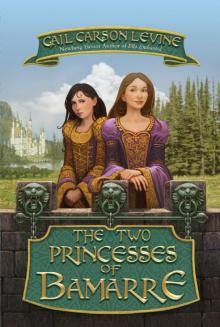 The Two Princesses of Bamarre
The Two Princesses of Bamarre Dave at Night
Dave at Night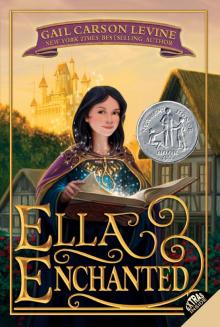 Ella Enchanted
Ella Enchanted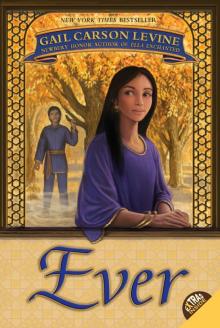 Ever
Ever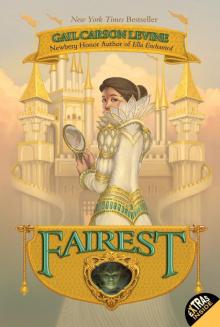 Fairest
Fairest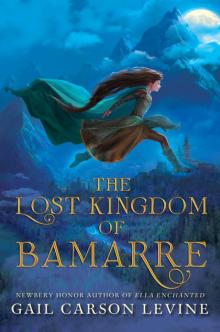 The Lost Kingdom of Bamarre
The Lost Kingdom of Bamarre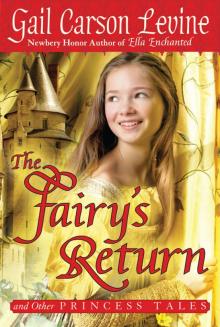 The Fairy's Return and Other Princess Tales
The Fairy's Return and Other Princess Tales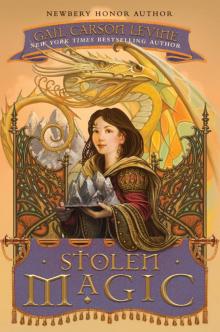 Stolen Magic
Stolen Magic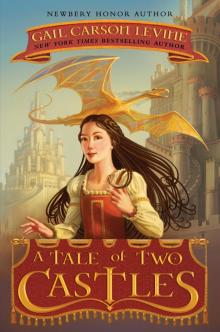 A Tale of Two Castles
A Tale of Two Castles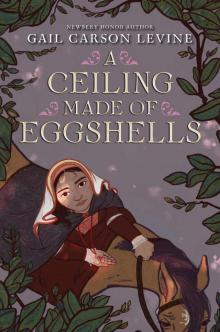 A Ceiling Made of Eggshells
A Ceiling Made of Eggshells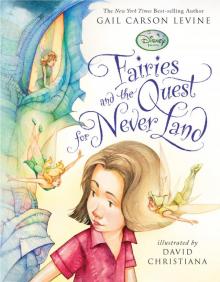 Fairies and the Quest for Never Land
Fairies and the Quest for Never Land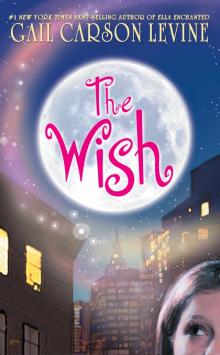 The Wish
The Wish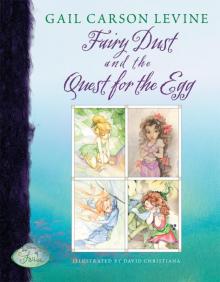 Fairy Dust and the Quest for the Egg
Fairy Dust and the Quest for the Egg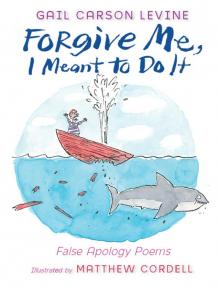 Forgive Me, I Meant to Do It: False Apology Poems
Forgive Me, I Meant to Do It: False Apology Poems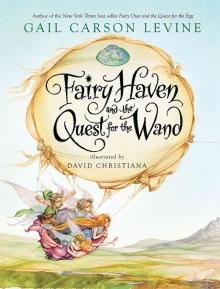 Fairy Haven and the Quest for the Wand
Fairy Haven and the Quest for the Wand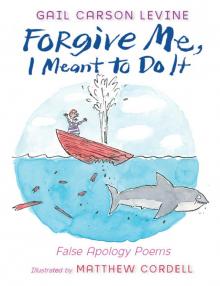 Forgive Me, I Meant to Do It
Forgive Me, I Meant to Do It